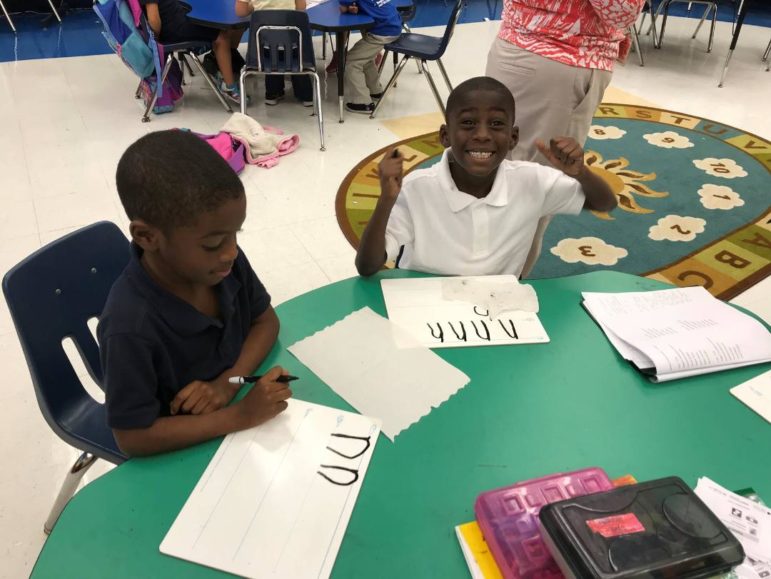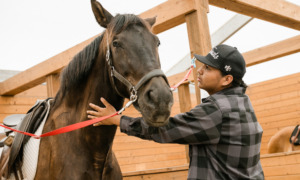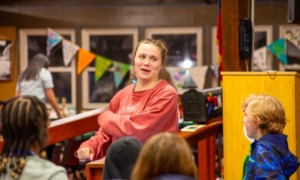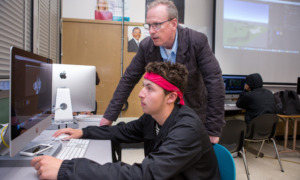
Photos by The Learning Alliance
First graders practice letter formation in the Moonshot Academy out-of-school time program. The Moonshot Moment effort includes a wide community network and focuses on kindergarten readiness, school support and extended learning to reach its goal of 90 percent reading proficiency in third grade.
More than a decade ago, Barbara Hammond and Liz Woody Remington were desperate. The two mothers in Vero Beach, Fla., didn’t know how to help their children.
“Our kids were failing kindergarten,” Hammond said. And the teachers couldn’t explain what was wrong.
Hammond’s son wasn’t paying attention and wasn’t doing what he was asked, his teacher said.
Woody Remington’s son felt lost in class and fell behind the other students.
When Hammond and Woody Remington figured out the problem, the actions they took ended up galvanizing a whole community.
Today, Vero Beach is the site of Moonshot Moment, a nearly 10-year old initiative in which the school district, businesses, nonprofits and community leaders are allied to make sure kids learn to read. The goal is to have 90% of kids reading proficiently by the end of third grade, in stark contrast to the 33% rate across the nation and the 20% rate for low-income kids in the United States.
Moonshot Moment has made significant progress. Third-grade reading proficiency across Indian River School District jumped from 53% in 2015 to 60% in 2018.
The effort began in 2009 with the creation of the nonprofit Learning Alliance and the collaboration of Indian River School District.
Finding right method of instruction
“It started in the extended learning space,” said Hammond, now CEO of The Learning Alliance.
To help her son, Hammond researched and found a program for dyslexic kids. Woody Remington had gone all the way to Baltimore to find a school for her son and then to American University to earn a master’s degree in learning disabilities.
The two wanted to bring affordable and effective tutoring to kids who, like their children, were struggling with reading. But they came to believe the issue was much larger.
“What we came to learn is that most of the teachers in the country are not trained with the knowledge and skills to help kids read,” Hammond said.
Not only that, but 50% of children in the Vero Beach area are not kindergarten ready, Woody Remington said. She is now director of professional development at The Learning Alliance.
[Related: What After-school Field Needs to Know About Best Ways of Teaching Kids to Read]
[Related: Tool Lets You Assess How Well Your OST Program Supports Reading]
The issue is not just about reading instruction, it’s also an issue of poverty, the two believe.
“You could fix all the issues with teaching and you’d still have an issue with [kindergarten readiness] — which is why it takes a community,” Hammond said.
“Schools can’t do it alone,” she said. “You do need extended learning time and summer to catch the kids up.”
The two teamed with businessman Ray Oglethorpe to launch an after-school and summer learning program in 2010 that provided teachers with training and practice.
In its first summer, the program served 35 children at each of two locations, the Boys & Girls Club and what was then the Gifford Youth Activity Center (now the Gifford Youth Achievement Center).
Today, The Learning Alliance supports reading intervention experts in nine of the Indian River District’s 13 elementary schools, serving about 300 children, and K-2 coaches in six of those schools. In addition, after-school programs in four schools offer literacy sessions for second and third graders at the bottom 50th percentile in reading.
Summer learning programs are located in six schools. Together, the after-school and summer programs serve 500 to 550 kids, Woody Remington said.
The method is important. Liz Bahl, director of program implementation for The Learning Alliance, describes it as direct, explicit, systematic and multisensory.
Many teachers, however, are leaving college without training in this proven method of instruction, which focuses on phonics and makes letter-sound relationships explicit.
“A lot of teachers are coming out of their programs without the strong foundational knowledge to teach the science of reading,” Bahl said.
The Learning Alliance is piloting an online course to allow teachers to add a reading endorsement credential to their certification, she said.
The Moonshot Moment campaign involves a large community.
About 125 partners — including nonprofits, funders and business leaders — are part of the Moonshot Community Action Network, which holds monthly meetings to discuss how to best support the effort.
It takes a whole community to reimagine education, the Learning Alliance founders would say.






























